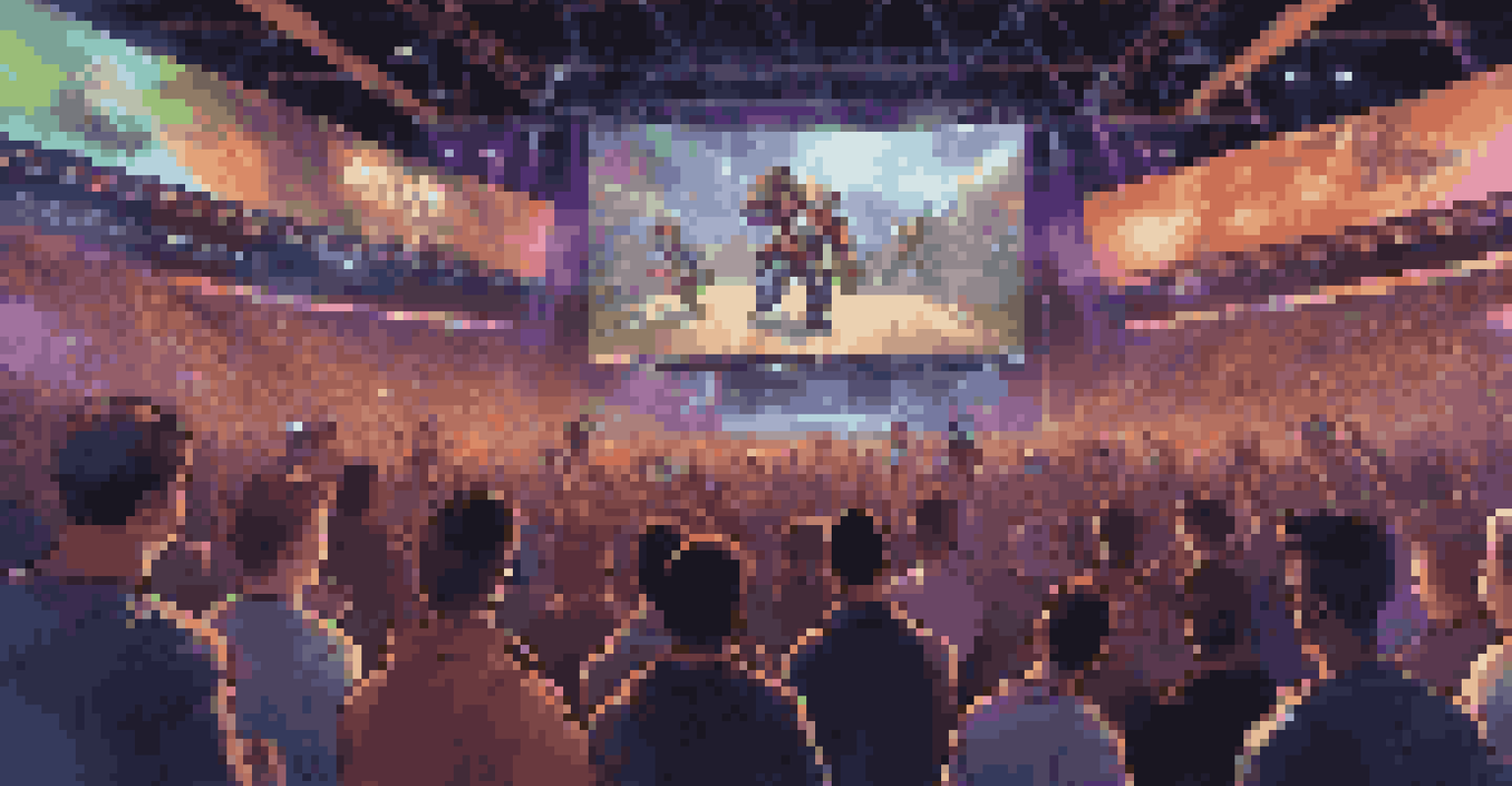The Importance of Cross-Platform Compatibility in Gaming

Understanding Cross-Platform Compatibility in Gaming
Cross-platform compatibility refers to the ability for players on different gaming systems to interact and play together. Imagine a world where your friend on Xbox can team up with you on PlayStation while both of you battle it out in the latest multiplayer game. This feature has become increasingly important as the gaming community expands and diversifies across various platforms.
Gaming is about connecting with people and building communities, and cross-platform play is the key to breaking down barriers between gamers.
The gaming industry is no longer limited to one type of console or device. With the rise of mobile gaming, PCs, and consoles, players expect to connect with their friends no matter what system they own. This expectation has led game developers to prioritize cross-platform compatibility in their designs, ensuring that everyone can enjoy the same experience.
As more games embrace this feature, it fosters a sense of community among players. It breaks down barriers that once kept gamers apart, allowing for richer interactions and collaborations that enhance the overall gaming experience.
The Benefits of Cross-Platform Play for Gamers
One of the most significant benefits of cross-platform play is the expanded player base. When gamers can connect across different platforms, it increases the number of players available for matchmaking, leading to shorter wait times and more balanced competition. Imagine hopping into a game and finding opponents quickly, instead of waiting for ages just to find a match.

Moreover, cross-platform compatibility allows friends to play together regardless of their chosen hardware. This inclusivity means that gamers can enjoy their favorite titles with friends who may have opted for a different console. It’s like being part of a club where everyone can join in regardless of how they got their membership.
Cross-Platform Play Expands Community
Cross-platform compatibility allows players on different systems to connect and play together, fostering a stronger gaming community.
Additionally, this feature can lead to longer game lifespans. With a larger, more engaged player base, developers are more likely to continue supporting and updating the game, knowing that a wide audience is invested. This ultimately results in a richer and more fulfilling gaming experience for everyone involved.
Challenges of Implementing Cross-Platform Compatibility
While cross-platform compatibility brings numerous advantages, it’s not without its challenges. Different platforms often have varying technical specifications and capabilities, making it complex for developers to create a unified experience. For instance, a game optimized for a high-end PC may not run as smoothly on a mobile device, leading to potential disparities in gameplay.
The future of gaming is about inclusivity, and cross-platform compatibility is a vital part of that vision.
Another challenge lies in balancing gameplay mechanics. Developers must ensure that players on all platforms have a fair chance, which can be tricky. Imagine a scenario where a player on a PC has an advantage over a console gamer due to superior controls or graphics; this could lead to frustration and an uneven playing field.
Lastly, there are often legal and business-related hurdles to cross. Companies may have exclusive agreements that restrict cross-platform features or influence how revenue is shared among platforms. Navigating these complexities requires careful planning and negotiation, which can delay the implementation of cross-platform play.
The Role of Game Developers in Fostering Compatibility
Game developers play a crucial role in promoting cross-platform compatibility. By prioritizing this feature during the game design phase, they can create a more inclusive environment for players. This proactive approach not only enhances player satisfaction but also boosts sales, as more gamers are drawn to titles that offer the ability to play with friends across platforms.
Developers can also engage with their communities to understand their desires for cross-platform features. Direct feedback from players can guide updates and patches, ensuring that the gaming experience continues to evolve in line with player expectations. It’s like turning your ear to a crowd and listening to what they really want, rather than assuming you know best.
Benefits of Inclusive Gaming
Cross-platform play increases player engagement, enhances matchmaking experiences, and promotes longer game lifespans.
Moreover, collaboration among developers can lead to innovative solutions. By sharing best practices and technologies, they can create more seamless cross-platform experiences. This spirit of collaboration can ultimately enhance the entire gaming ecosystem, benefiting everyone from developers to gamers.
Success Stories of Cross-Platform Games
Several games have successfully implemented cross-platform compatibility, setting a benchmark for others to follow. Titles like 'Fortnite' and 'Minecraft' have embraced this feature, allowing players from different platforms to interact freely. This inclusivity has not only boosted their popularity but also helped forge a massive, engaged community around these games.
These success stories illustrate how cross-platform compatibility can enhance a game’s appeal. Players are more likely to invest time and money into a game that allows them to connect with friends, regardless of their device. It’s akin to a popular café that welcomes all patrons, regardless of their preferred drink; everyone feels included and valued.
Furthermore, these games often see continuous updates and content releases, driven by their diverse player base. This ongoing support keeps the gaming experience fresh and exciting, encouraging players to return and explore new features together. It’s a win-win situation that benefits both developers and gamers alike.
The Future of Cross-Platform Gaming
The future of gaming looks promising when it comes to cross-platform compatibility. As technology continues to evolve, developers are finding new ways to bridge the gap between different platforms. Innovations in cloud gaming and streaming services could make it easier than ever for players to enjoy their favorite titles, regardless of their hardware.
Moreover, as the gaming community continues to grow, so does the demand for inclusive gaming experiences. More players are advocating for cross-platform play, and developers are beginning to listen. Imagine a future where your gaming experience is seamless and accessible, no matter how you choose to play—sounds exciting, right?
Challenges in Compatibility Development
Creating cross-platform experiences involves technical, gameplay balancing, and legal challenges that developers must navigate.
However, challenges will remain, and developers must remain vigilant in addressing these issues as they arise. The balance of fairness, performance, and player experience will always be at the forefront of discussions surrounding cross-platform gaming. With a collective effort, we can look forward to a future where every gamer is a part of a unified community.
Conclusion: Embracing a Cross-Platform Future
As we wrap up our discussion, it's clear that cross-platform compatibility is more than just a trend—it's a crucial aspect of modern gaming. Embracing this feature not only enhances player experiences but also fosters a sense of community that transcends hardware limitations. It's like opening the doors to a grand hall where everyone is welcome to join the festivities.
By prioritizing cross-platform play, developers can create games that appeal to a wider audience, leading to longer game lifespans and more vibrant gaming communities. The benefits are clear: increased engagement, better matchmaking, and a stronger sense of camaraderie among players. It’s a win for everyone involved.

In conclusion, as gamers, we should advocate for and support cross-platform compatibility in our favorite titles. By doing so, we can help shape the future of gaming into one that is inclusive, engaging, and truly reflective of the diverse community we represent.